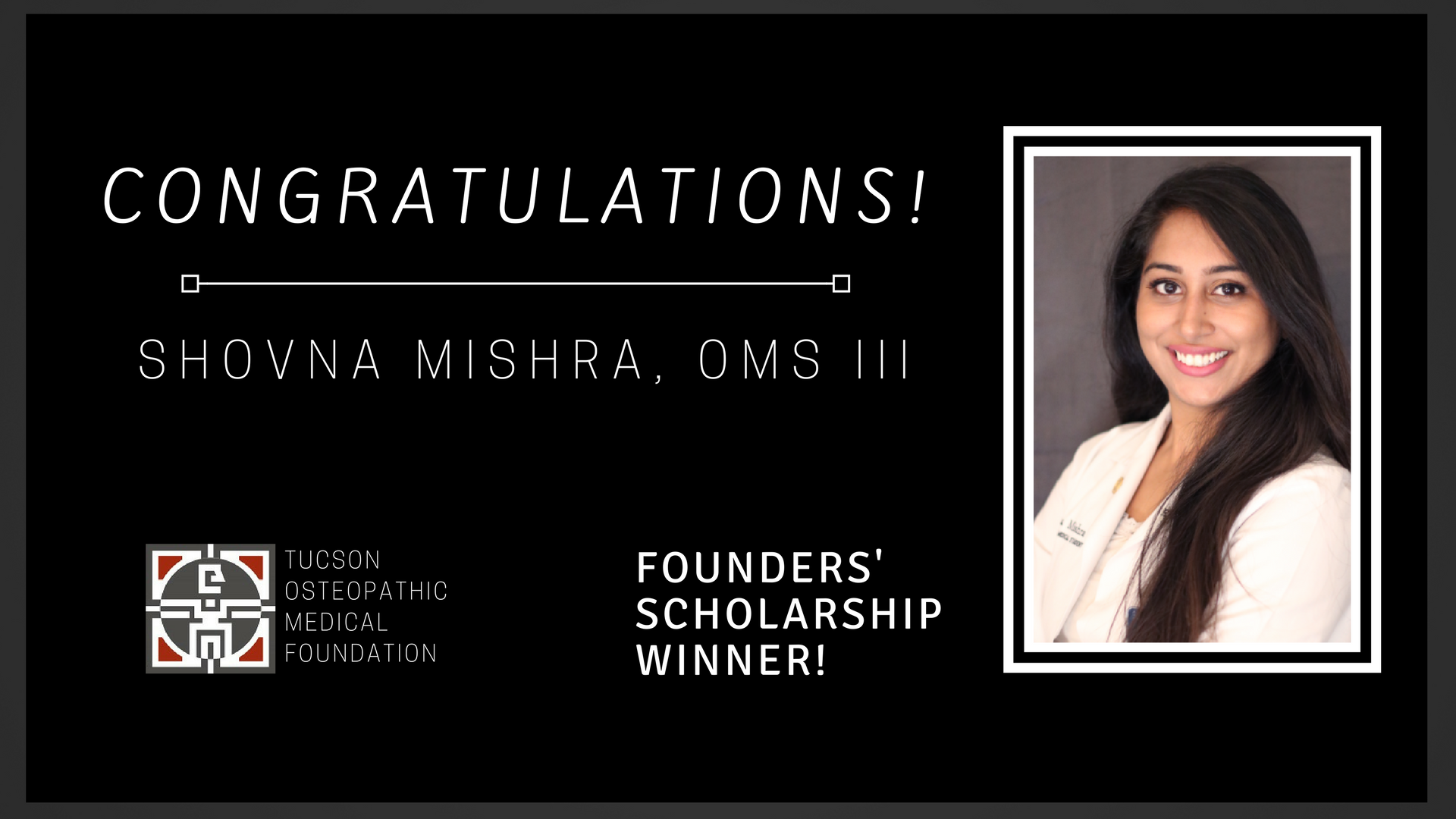Shovna Mishra, OMS III at A.T. Still University – SOMA, Awarded $5,000 Founders’ Scholarship
February 25, 2018

Shovna Mishra, OMS III at A.T. Still University - SOMA, has been a resident of Arizona since 2006. She pursued a dual degree in Business Management (Entrepreneurship) and Business Sustainability at ASU and graduated in 2014 as one of the top five students in her class. One of her major accomplishments during her undergraduate and medical school years has been starting a preventive pediatric nutrition education program as a non-profit organization. To date, she has led teams in raising $28,000 in grant funding to support this program, which allowed for the education of over 1,200 elementary students at over 15 community sites since 2010. She has also led and assisted in the completion of three research projects to validate this program, one of which resulted in a recent publication in JAOA. This year, she received the ACP Medical Student of the Year award. Read on to hear more about Shovna's days as a medical student and what inspires her to further her skills in OMT, nutrition education, and integrative medicine.
What is your favorite thing to do in your (very limited!) free time?
Any type of dance from Zumba to Bollywood to classical forms.
How did you discover you wanted a career in medicine?
I was always curious about poverty and inequality growing up. I knew I wanted to do something about it, but I didn't know what. At first, I took up Political Science as my major in college but found the political system too rigid for the changes I wanted to make. Then, I turned my attention to Business, earning a dual bachelor's degree in Management (Entrepreneurship) and Sustainability. In my sustainability classes, I learned about the healthcare system in relation to the environment. I was taught to look at systems as a whole, and I realized that at the heart of everything, health is a fundamental need. If I could apply my management degree to managing someone's health, I could impact the social problems that I had wanted to address from the beginning.
Who has been the most influential person in your life throughout your journey as a medical student?
My older sister has been the most influential person in my life. Being five years ahead of me, I was always able to look up to her example. When she first became a certified nursing assistant, she would tell stories about her experiences in Geriatric care at an assisted living facility. Her stories showed me how rewarding the healthcare field can be. She is now an RN, and we have shared our medical journey together. We listen to each other's interesting cases, we vent to each other, and we inspire each other to continue learning.
Which specialty do you plan to practice?
I'm considering Family Practice, Pediatrics, OB/GYN, Psychiatry, or some sort of combination of those fields.
Tell us about a typical day in the life of a medical student.
To be honest, a typical day for me is always a scramble. I wake up and rush either to clinic or the hospital depending on what type of rotation I'm on. I am sometimes successful at working out for half an hour in the morning and always regular at eating breakfast. I make it to clinic or the hospital just in time to start seeing patients. In clinic, we see patients, present our findings to the preceptor, and chart. In the hospital, we see our patients usually a bit earlier in the morning, chart, report to the attending, and round with them. Usually clinic days are over by 5:00 pm and hospital days are over by 7:00 pm. I go home, eat dinner, and watch TV for a little bit. After that, I'll either read up on what I am supposed to look up for my attending or study for my shelf. I go to sleep by 10:00 pm or 11:00 pm and start over again the next day.
What advice would you give to a student considering medicine as a career?
Believe in achieving your truest potential. You will feel incompetent every day, sometimes barely making it through the hoops. Instead of letting this feeling deter you, you must keep going. It's the only way you will become competent one day. The best part about choosing medicine as a career is that you can count on your colleagues to be amazing and inspiring people. They will keep you going through rough times.
What is the most interesting thing you've discovered so far in your medical training?
The relationship between poverty, stress levels, and poor health has been a known correlation. It is difficult and sad to see examples of this in my patient's cases, but it helps me understand the problem better.
What excites you about becoming a physician?
Meeting new and unique individuals every day, becoming their companion in sharing their successes and sorrows, and being able to profoundly impact their lives.
What led you to pursue osteopathic medicine as opposed to allopathic medicine?
Osteopathic medicine provided an opportunity to learn a whole other skill that is natural and cost-effective that allopathic medicine does not offer.
Technological advances may occur at a higher rate than holistic advances in medicine. The single accreditation system may further jeopardize osteopathic training. Nonetheless, the effectiveness of osteopathy speaks for itself, as it did when the Spanish influenza hit in 1918. Today, osteopathy has spread internationally to more viable healthcare systems. It will persist because it works.

